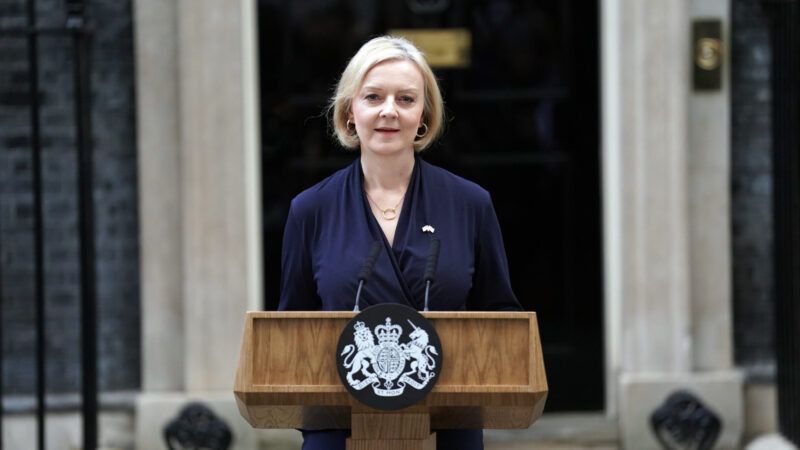Liz Truss Resigns as British Prime Minister
After just six weeks in office, the embattled Conservative leader is out.

British Prime Minister Liz Truss has resigned after just six weeks in office, capping off a politically and economically chaotic tenure. Her resignation follows a period of market turmoil spurred by her economic plans, which included a package of deficit-financed subsidies and tax cuts intended to offset high energy costs.
On October 14, Truss responded to the backlash against her economic platform by firing Chancellor of the Exchequer Kwasi Kwarteng. "One independent analysis expected it to cost taxpayers 190 billion pounds ($207 billion) this fiscal year," the Associated Press reported, with "opponents accus[ing] the government of dodging scrutiny by rolling out a major shift in economic policy without the normal analysis from the independent Office for Budget Responsibility."
Kwarteng's replacement, Jeremy Hunt, quickly backtracked on his predecessor's policies and denounced debt-driven economics. "We are a country that funds our promises and pays our debts," he said earlier this week as he announced plans to reverse nearly all of the planned tax cuts and downsize the energy subsidies.
As Hunt rolled back Truss' economic platform, financial markets stabilized but the political atmosphere did not. In advance of a vote yesterday on fracking—which Truss wants to legalize but many Conservative members of Parliament oppose—her administration threatened lawmakers who voted to block fracking with dismissal from the party. Enraged by the pressure, 40 Conservative MPs abstained from the vote. A YouGov poll this week indicated that just 10 percent of Britons held a favorable view of Truss.
"I recognize that given the situation, I cannot deliver the mandate on which I was elected by the Conservative Party," Truss said in her resignation announcement. Upon leaving office, she will become the shortest-serving prime minister in British history.
Her party is set to elevate a new prime minister by October 28. Former Chancellor of the Exchequer Rishi Sunak, who previously criticized Truss' tax cuts as a "fairy tale" and said that "borrowing your way out of inflation isn't a plan," is a favorite to succeed Truss.
Her successor "will have to navigate a political crisis and economic turbulence," notes The Wall Street Journal. "The new leader is almost sure to face a long winter of discontent, with real wages forecast to fall, labor unions promising a series of strikes and many voters demanding elections."

Show Comments (161)